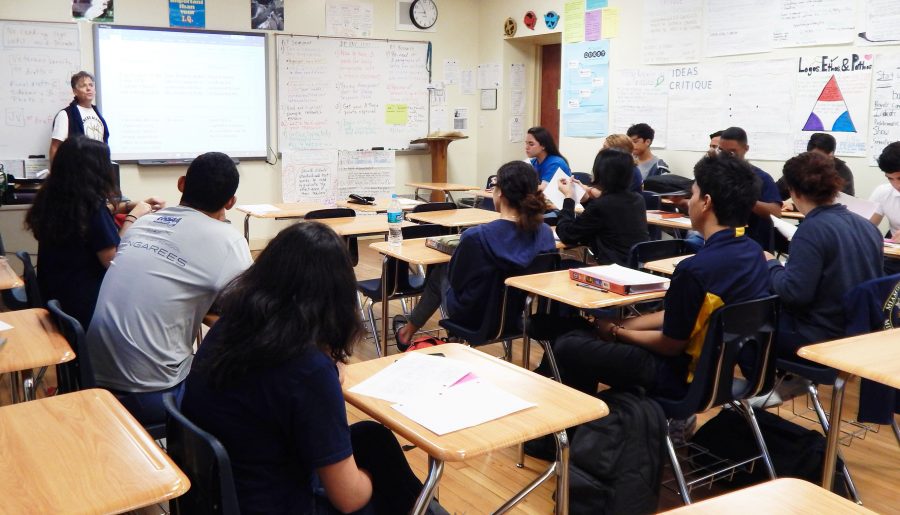Dual Enrollment at Miami High
“Hey, do you want to hang out this weekend?”
“Sorry, but I can’t. I have to study for my grammar test in ENC 1101.”
“Grammar test?! But you’re a senior. Shouldn’t grammar be a piece of cake for you by now?”
“Actually, ENC 1101 is a college level class, and nothing is a piece of cake in there.”
Dual enrollment (DE) is a program that allows high school students, usually juniors and seniors, to enroll in college courses for credit prior to their high school graduation. Students taking these courses can receive college credits that can be applied towards high school and college graduation, and be transferred to other colleges and universities.
“I feel like the best part is that we get free college courses,” says junior Helen A, who is taking a dual enrollment education class with Mr. Waugaman. “We will not receive this opportunity after high school, might as well take advantage.”
These classes are similar to Advanced Placement classes. However, in AP courses you have to pass a final test at the end to get your college credit. With DE, on the other hand, you get the credit if you pass the class overall.
Miami High currently offers 4 dual enrollment classes: in education, English, fitness, and computer programming. In order to take these courses, says dual enrollment coordinator Ms. Torossian, you must have a 3.0 unweighted GPA (students with a 2.7-2.9 GPA may obtain a GPA waiver), have passing scores on the PERT, ACT, or SAT.
Junior Enosha Olivier said she prefers dual enrollment courses over Advanced Placement since they require a less strenuous workload and are overall more laid back. Senior Tatyana Garcia likes dual enrollment because there isn’t a big test at the end of the course.
Some students, such as junior Daniel Rodriguez, feel that the DE courses offered at Miami High aren’t as rigorous as real college classes and that they’re only giving students a fake view on college.
Although some students claim that DE courses are easier than AP, that doesn’t mean they are not challenging. In EDF 1105 (Intro. To Education) & EDF 2085 (Teaching Diverse Populations) Mr. Waugaman says he expects high performance, quality work, and the willingness to do good from his students because it is not easy work.
ENC 1101 and ENC 1102 teacher Dr. DeNight says, “My number one expectation is that students accept that this is a college class.”
Junior Javier Lopez said that one of the worst parts about taking a dual enrollment course is that any grade that is a “C” or below may not get you credit for the course.
Sophomore Gina Martinez says, “The higher expectations in the class create pressure that tends to stress students out.”
With some good advice, many students can succeed in dual enrollment. “My suggestion for students taking DE is to study hard in order to keep a good grade point average,” says senior Diandra Leon.
Senior Ronald Christalin advises students to do all of your work, turn it in on time, and behave maturely.
“My best suggestion is to organize yourself and keep track of your assignments,” says Gina Martinez. “Recall that you’re a college student and a lot is expected from you, so take the classes seriously because those grades will also go on your college transcript.”
Dr. DeNight shared his 3 secrets for success in dual enrollment: make sure you’re reading the textbook since college classes are textbook-based, come for help after school when needed, and do not miss class.
Mr. Waugaman says, “Take your time and read all required and suggested texts. Be motivated to get work done on time, and make time for this class in terms of out-of-class studying.”

